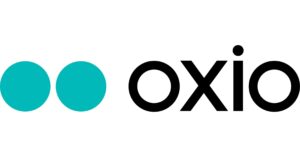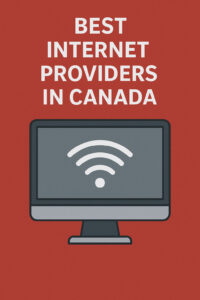Let’s be real: the Wi-Fi cutting out during a timed online exam is the stuff of nightmares. So is the endless buffering circle when you’re just trying to stream a movie after a brutal midterm week. Finding the best internet for students in Canada isn’t just about getting online; it’s about securing your academic and social lifeline without emptying your bank account.
Between tuition, textbooks, and the ever-rising cost of groceries, the last thing you need is an overpriced, unreliable internet plan. This guide cuts through the marketing fluff. We’ll break down how much speed you actually need, spotlight the best providers for student budgets, and share some insider tips to help you save money.
Telus

Beanfield
*Disclaimer: Prices and plan details are based on information are subject to change. Please visit the provider’s website for the most current information.
Your Digital Lifeline: Why Your Internet Choice is Critical
For today’s student, a solid internet connection is as essential as a laptop. It’s the invisible infrastructure supporting your entire university experience. Choosing the wrong plan can lead to genuine headaches when deadlines are looming.
Here’s why getting it right matters so much:
- Your Budget is Tight: You’re likely on a fixed income. A predictable, affordable internet bill means one less financial stressor. We’re looking for plans with no surprise fees or mid-year price hikes.
- Speed for Seamless Learning: A slow connection means pixelated lectures, lagging Zoom calls with your project group, and frustratingly slow downloads for research papers and course software. You need enough bandwidth to keep up with the demands of modern education.
- Flexibility for Student Life: Students move. A lot. You might be in a dorm for eight months, then subletting for the summer, then moving into a shared house. You need a provider that won’t lock you into a rigid two-year contract with hefty cancellation fees.
- The Roommate Test: Your internet doesn’t just serve you; it serves your roommates’ Netflix binges, their partners’ video calls, and their all-night gaming sessions. A good plan has to handle multiple devices at once without collapsing during peak hours (like 9 PM on a Sunday).
- Rock-Solid Reliability: An internet outage during an online final exam or a major assignment submission is catastrophic. Reliability isn’t a perk; it’s a non-negotiable requirement.
Decoding the Megabits: How Much Speed Do You Actually Need?
Internet providers love to upsell you on gigabit speeds, but not every student needs that much firepower. Your ideal speed depends entirely on your living situation and how you use the internet.
- The Solo Scholar (Light Use): 50-75 MbpsPerfect for: A single student in a bachelor’s or one-bedroom apartment.
Handles: Streaming lectures, HD Netflix, browsing, and online classes on one or two devices simultaneously. This is a great budget-friendly starting point. - The Duo (Moderate Use): 100-300 MbpsPerfect for: You and a roommate.
Handles: Two people can attend Zoom classes smoothly, stream in 4K, and engage in casual online gaming without tripping over each other’s bandwidth. - The Classic Student House (Heavy Use): 300-500 MbpsPerfect for: 3-4 roommates who are all heavy internet users.
Handles: Multiple 4K streams, competitive online gaming, large file downloads, and video calls happening all at once. This tier prevents the dreaded “who’s slowing down the internet?!” arguments. - The Power Users (Very Heavy Use): 500 Mbps – 1 Gbps+Perfect for: Large student houses (5+ people), content creators, or serious gamers.
Handles: Everything, for everyone, all the time. If your house is full of smart devices, streamers, and gamers who demand low latency, investing here ensures total peace.
Don’t Forget About Upload Speed!
Providers always advertise download speed, but upload speed is crucial for students. It determines how fast you can send information from your computer to the internet. If you frequently submit large video projects, back up files to Google Drive, or want to look crystal-clear on video calls, aim for an upload speed of at least 15-20 Mbps. Fibre optic plans often have “symmetrical” speeds (e.g., 500 Mbps download and 500 Mbps upload), making them ideal for creators.
Best Internet Providers for Students in Canada
Canada’s internet landscape is dominated by a few big players and a host of excellent independent providers that offer amazing value. We’ve broken them down to help you choose.
The Big Three: Power and Performance
1. Rogers Internet
As one of Canada’s largest providers, Rogers offers high-speed cable and fibre internet with broad coverage, especially in Ontario and Atlantic Canada. Their Ignite plans are powerful and often come bundled with perks.
Insider Tip: Rogers’ back-to-school promotions are some of the best in the market, often including VISA gift cards or free streaming subscriptions for a year. It’s worth waiting for these deals in August. Check Rogers’ Student Deals Here
- Pros: Excellent speeds for large households, reliable network, valuable student promotions and entertainment bundles.
- Cons: Can be pricey without a promotion; watch for significant price hikes after your initial term ends.
2. Bell Internet
Bell is the king of fibre-optic internet in Canada, delivering incredibly fast and reliable pure fibre service in many urban centres. For students who need symmetrical speeds and low latency for gaming or creating, Bell is hard to beat.
Insider Tip: If Bell Fibe is available at your address, it’s a top-tier choice for reliability. Ask about their no-contract options specifically for students, which they sometimes offer. See Bell’s Current Student Offers
- Pros: Blazing-fast symmetrical speeds, industry-leading reliability and low latency, strong urban fibre coverage.
- Cons: Premium pricing, and their non-fibre (DSL) plans in rural areas are much slower.
3. Telus Internet
For students in Alberta and British Columbia, Telus is the premier fibre provider. Their PureFibre network is renowned for its speed and consistency, and they are known for excellent customer service.
Insider Tip: Telus often bundles their internet with mobile plans (Koodo is their flanker brand) for significant monthly savings, a perfect combo for students. Explore Telus Student Packages in AB/BC
- Pros: World-class fibre network with symmetrical speeds, excellent customer support, attractive student perks and bundle options.
- Cons: Service is primarily limited to Western Canada.
The Value Champions: Get More for Less
4. Virgin Plus & Fido Internet
These are the flanker brands of Bell (Virgin) and Rogers (Fido). They operate on the same reliable networks but offer simpler plans at a much more student-friendly price point. They are the perfect middle ground.
Insider Tip: These brands often have “price guarantee” promotions for 12 or 24 months, giving you budget certainty. They are fantastic for 1-3 person apartments. See Virgin Plus Deals | See Fido Deals
- Pros: Cheaper prices on the same reliable networks as the big guys, frequent promotions, no-frills setup.
- Cons: Speeds may not reach the top-tier gigabit levels of their parent companies.
5. TekSavvy
A long-time favourite in Canada, TekSavvy is an independent provider that champions fair pricing and transparency. They resell services over Rogers’ and Bell’s networks, giving you reliable infrastructure without the premium price tag.
Insider Tip: TekSavvy is strictly no-contract, which is ideal for students who don’t want to be locked in. You may need to buy your modem upfront, but it often saves you money in the long run. Check Plans at TekSavvy
- Pros: Highly competitive and transparent pricing, no contracts, award-winning customer support.
- Cons: You often need to purchase your own hardware, and activation can take longer than with the big brands.
6. Oxio
Known for its quirky marketing and radically transparent approach, Oxio has become a student favourite. All fees, including the modem rental, are built into one simple monthly price, and there are no contracts.
Insider Tip: Oxio has a great referral program. Find a friend with Oxio, use their code, and you both get a month free. It’s a great way to save. Learn More About Oxio
- Pros: Extremely transparent “what you see is what you pay” pricing, no contracts, free Eero 6 router included.
- Cons: A newer provider, so their availability can be more limited in certain regions.
Pro Tips for Slashing Your Internet Bill
- Split the Bill, Upgrade the Plan: Don’t get four separate cheap plans. Get one fast plan and split the cost. It’s almost always cheaper and gives everyone better performance. Use a bill-splitting app like Splitwise to avoid awkward conversations.
- Always Ask for Student Deals: Even if it’s not advertised, always ask the sales rep: “Do you have any discounts or promotions for post-secondary students?” The worst they can say is no.
- Look for Bundles: If you also need a mobile plan, bundling it with your internet from providers like Rogers, Bell, Telus, or Virgin can unlock significant discounts.
- Buy Your Own Modem/Router: Many providers charge a $10-$15 monthly rental fee. Buying a compatible modem for $120-$150 can pay for itself in a year and save you money for the rest of your degree.
- Set a Calendar Reminder: If you sign up for a 12-month promotional rate, set a reminder on your phone for month 11. This gives you time to call the provider to renegotiate or switch before the price jumps.
Frequently Asked Questions (FAQ)
Do I really need a contract?
For students, it’s highly recommended to go with a no-contract or month-to-month plan. This gives you the flexibility to move or cancel without paying massive fees. Providers like TekSavvy and Oxio specialize in this.
Is the free Wi-Fi in my university residence good enough?
It can be a gamble. Residence Wi-Fi is often slow and congested during peak hours (evenings and weekends). For reliable performance for online exams and important calls, having your own dedicated connection is a smart investment.
What about installation fees?
Many companies waive installation fees during back-to-school promotions, especially for online sign-ups. If you see an installation fee, ask if they can waive it to get your business.
The Final Verdict: Your Best Choice
The best internet plan is the one that fits your specific situation.
- For the Budget-Focused: Oxio and TekSavvy offer the best combination of fair pricing, flexibility, and transparency.
- For the Urban Power User or Gamer: If you live in a major city, you can’t beat the raw speed and reliability of a pure fibre plan from Bell or Telus.
- For the Best of Both Worlds: Virgin Plus and Fido deliver a fantastic balance of price and performance, using top-tier networks without the top-tier cost.
Do your homework by comparing the options available at your specific address and asking about student deals. A little bit of research now will ensure you have a fast, reliable, and affordable connection for the entire school year.










